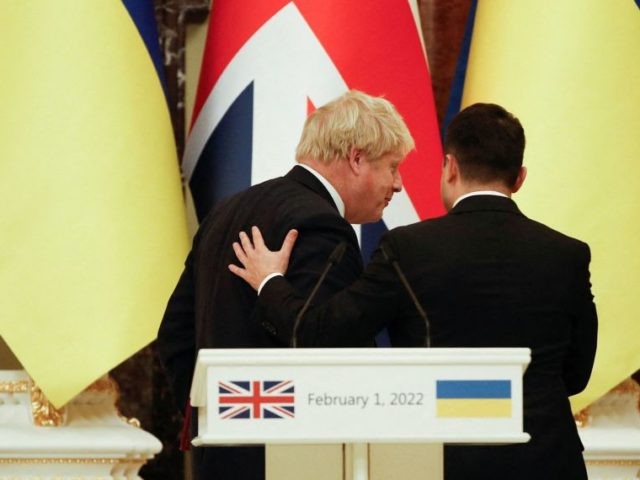Boris Johnson flew to Ukraine Tuesday afternoon, pledging support to Kyiv including an £800 million giveaway to the Ukrainian government, a move that may leave a bitter taste given Johnson’s more ascetic posture domestically, which in the last few days has included demanding the British people cough up more taxes.
Speaking at a joint press conference with Ukraine’s President Volodymyr Zelensky, UK Prime Minister Boris Johnson laid out how Britain would support Ukraine in the case of a Russian invasion, listing financial support now to sanctions on the Russian Federation in the future should conflict develop.
Standing at the podium at the Mariinsky Palace on Tuesday, Johnson outlined the support the British taxpayer had already underwritten for Ukraine, which until now had been comparatively reasonable and included training by British soldiers for 22,000 Ukrainian troops and £2.2 million worth of “non-lethal” military equipment.
That aid has intensified in recent weeks, with the delivery of dismounted, man-portable anti-tank missiles from British military stocks to Ukraine in a series of flights by RAF aircraft. Military analyst group Janes’ identifies the weapons as Britain’s Next-generation Light Anti-tank Weapons (NLAWs). While the anti-tank missile is broadly a defensive weapon, it is nevertheless a lethal weapon designed to be capable of taking out main battle tanks.
The exact value of the weapons transfer, and whether it was paid for by the Ukrainian government, has not yet been revealed.
But more is to come, the Prime Minister said. He told gathered journalists: “Two weeks ago we sent anti-tank weaponry to strengthen Ukraine’s defences further. And today, I have announced a further £88 million of UK funding to support good governance and energy independence in Ukraine. This will bolster your efforts… to build a free and prosperous Ukrainian society, free of malign influences.”
Ukraine is not a NATO member and while its existence outside Russia’s sphere of influence is a key strategic goal for expansionist Brussels, the United Kingdom is no longer a member of the European Union and is not duty-bound to intervene for the EU’s narrow goals. Indeed, concerns about a developing EU army and the Union’s own foreign service creating the possibility for the bloc creating its own conflicts and wars in the future was a much-discussed issue at the time the British people voted to leave the EU in 2016.
Beyond the fact British defence companies like Babcock are already benefitting from Ukraine in terms of considerable contracts to provide warships and missiles and energy security — and there are certainly less destructive ways to bring down Britain’s record-breaking gas prices than going toe-to-toe with Russia — the UK has few direct interests in Ukraine. Yet just days after the UK government slapped down suggestions a looming tax rise might be cancelled, arguing that the nation is so strapped for cash after two years of Coronavirus lockdown that it needs to take more from working Britons to save the NHS, Mr Johnson announced he was funnelling money to Ukraine.
Prefacing his cash giveaway, Mr Johnson underlined what he perceived to be the seriousness of the situation. He said in his remarks, that: “We have to face a grim reality… today more than 100,000 Russian troops are gathering on your border in perhaps the greatest demonstration of hostility towards Ukraine in our lifetimes. The potential deployment dwarfs the 30,000 troops Russia sent to invade Ukraine in 2014.”
Yet his alarmist stance stands at odds, somewhat, with the Ukrainian government’s own assessment of the Russian threat. Indeed, Zelensky himself just last week expressed his incredulity the Russian situation had not materially changed, all that had appeared to develop was interest in his country by the media.
He said that the threat of Russian invasion was basically constant and the pending Russian escalation so hotly discussed in Western Europe capitals and Washington had actually already happened. He said: “I don’t think the situation is more intense than it was at that time, at peak time in 2021… ”
“… There was no such coverage at that time of Ukraine… We have been talking about this for eight years now.”
In terms of response, Boris Johnson was clear that if Russia pushed any further the UK would have no choice but to react with sanctions against Russian interests and individuals in London. Yet this too seems to be contrary to the action Ukraine is actually asking for.
Johnson said: “We are also preparing a package of sanctions and other measures to be enacted the moment the first Russian toecap crosses further into Ukrainian territory. And we have done all of this and prepared this not as a show of hostility towards Russia, but as a demonstration that we will always stand up for Freedom and Democracy and Ukrainian sovereignty in the face of aggression.”
Zelensky himself has been clear that he believes “prevention is better than cure”, contrary to Johnson’s approach of waiting for Russia to push further into Ukraine first. Speaking in December, the Ukrainian President said: “Some leaders suggest a format of responding (…) after a possible escalation on the part of Russia to introduce a strong sanctions policy… Our state is interested in a strong sanctions policy that would precede a possible escalation, and then, I suggest, this escalation might not even occur”.
Introducing sanctions after military activity would have considerably less impact than doing it as a deterrent beforehand, he said.

COMMENTS
Please let us know if you're having issues with commenting.